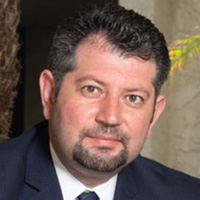These 2 Emotional Biases Could Kill Your Retirement
Are your emotions sabotaging your retirement plans? Some basic knowledge and careful introspection can go a long way toward avoiding deadly pitfalls.


Profit and prosper with the best of Kiplinger's advice on investing, taxes, retirement, personal finance and much more. Delivered daily. Enter your email in the box and click Sign Me Up.
You are now subscribed
Your newsletter sign-up was successful
Want to add more newsletters?

Delivered daily
Kiplinger Today
Profit and prosper with the best of Kiplinger's advice on investing, taxes, retirement, personal finance and much more delivered daily. Smart money moves start here.

Sent five days a week
Kiplinger A Step Ahead
Get practical help to make better financial decisions in your everyday life, from spending to savings on top deals.

Delivered daily
Kiplinger Closing Bell
Get today's biggest financial and investing headlines delivered to your inbox every day the U.S. stock market is open.

Sent twice a week
Kiplinger Adviser Intel
Financial pros across the country share best practices and fresh tactics to preserve and grow your wealth.

Delivered weekly
Kiplinger Tax Tips
Trim your federal and state tax bills with practical tax-planning and tax-cutting strategies.

Sent twice a week
Kiplinger Retirement Tips
Your twice-a-week guide to planning and enjoying a financially secure and richly rewarding retirement

Sent bimonthly.
Kiplinger Adviser Angle
Insights for advisers, wealth managers and other financial professionals.

Sent twice a week
Kiplinger Investing Weekly
Your twice-a-week roundup of promising stocks, funds, companies and industries you should consider, ones you should avoid, and why.

Sent weekly for six weeks
Kiplinger Invest for Retirement
Your step-by-step six-part series on how to invest for retirement, from devising a successful strategy to exactly which investments to choose.
If investing and saving for retirement were based solely on objective mathematics, a very healthy nest egg could be a forgone conclusion for many of us. Realistically, however, investors are human beings, with wants, feelings, conflicting priorities and a wide range of emotions. In fact, a subfield of behavioral economics called behavioral finance studies how psychological influences and biases affect the financial behaviors of investors.
While there are many facets to behavioral finance and complexity behind the science, some of the concepts I see at work in my daily practice can be simplified to help the average investor identify and change damaging thoughts and behaviors. These include the emotional biases of overconfidence and herd behavior.
Watch Out for Overconfidence Right Now
Overconfidence is an emotional bias that I see most at work in an up market. When individuals see impressive gains in their portfolios, it can distort their decision making. "Winning" can create emotional highs and disconnect us from rational behavior.
From just $107.88 $24.99 for Kiplinger Personal Finance
Become a smarter, better informed investor. Subscribe from just $107.88 $24.99, plus get up to 4 Special Issues

Sign up for Kiplinger’s Free Newsletters
Profit and prosper with the best of expert advice on investing, taxes, retirement, personal finance and more - straight to your e-mail.
Profit and prosper with the best of expert advice - straight to your e-mail.
For example, one individual I know is in her 60s and unemployed, with her assets invested in high-risk instruments. While she is focused only on the gains she is currently experiencing, I have asked her to recognize how much those investments can go down in the future — to the tune of about 25% of her funds and hundreds of thousands of dollars. Despite my best attempts to encourage her to diversify and spread risk, she continues on her current path of unrealistic optimism, with huge losses only a market downturn away.
In addition to being overconfident in the market, an investor can also be overconfident in his or her own abilities. After all, we all think we are great drivers, yet more than 36,000 traffic fatalities occurred in 2020, according to the National Highway Traffic Safety Administration. Like driving, investing has inherent risk. We need to be aware of the risks and take steps to migrate those risks. Just like seatbelts cut down on our risk of dying in a car accident, exercising prudence and caution in a financial plan can help protect us from devastating losses.
Therefore, when looking at your investments, exercise some introspection about your level of confidence.
- Are you giddy because your portfolio is so high?
- Have you taken steps to also consider what your losses might be, and can you comfortably accept those losses?
- Are you ignoring the voices of financial experts who are encouraging prudence?
Feel the Urge to Follow the Herd? Don’t You Dare
Likewise, another emotional bias is herd behavior. In essence, we may ignore our own inner dialogue of caution or the advice of professionals and instead “follow the crowd” and its strategies. The most detrimental way I see this at work in my practice is when an up streak is featured throughout the news. This triggers “herd” investors to buy stocks (at a high price). When the news is then filled with market declines, and they see their accounts tumbling, herd investors sell (at a low price). People also do the same in their 401(k)s, transferring money between sub accounts at the worst possible times. All in all, the buzz of “now” gets into their heads, and the old adage of “buy low and sell high“ goes out the window.
Following the herd is a devastating way to manage investments, and the best things to do are ignore what everyone else is doing and remind yourself of your overall plan, which should include diversification, taking a long-term view and rebalancing your assets.
Before you look at your plan, again ask yourself if you are prone to emotional bias — this time, herd behavior.
- Do you have a track record of moving money out of accounts or investments at a loss, and then moving money in or purchasing when the market is up?
- Do you worry about your accounts when you hear that the market is up or down and itch to take action?
- Are you ignoring your long-term plan and acting out of fear or glee?
Prudent investing requires patience and thoughtful decisions to help you reach your retirement goals and balance out the ups and the downs. Taking a good hard look at your emotions and biases can be the first step to improving your investment strategy for the long-term. Be honest with yourself if you see a pattern of mistakes and take steps to ensure that your emotions don’t get the better of you.
Profit and prosper with the best of Kiplinger's advice on investing, taxes, retirement, personal finance and much more. Delivered daily. Enter your email in the box and click Sign Me Up.

Jack Gelnak is an experienced and talented adviser with a proficient and comprehensive understanding of investment concepts, tax and legal planning solutions. After 23 years as a practicing wealth manager, Jack finds satisfaction in getting to know each of his clients personally. Employing kindness, insight, compassion and integrity, he uses his knowledge and experience, together with coherent communication to identify solutions and explain complicated concepts in a way that make sense.
-
 Quiz: Do You Know How to Avoid the "Medigap Trap?"
Quiz: Do You Know How to Avoid the "Medigap Trap?"Quiz Test your basic knowledge of the "Medigap Trap" in our quick quiz.
-
 5 Top Tax-Efficient Mutual Funds for Smarter Investing
5 Top Tax-Efficient Mutual Funds for Smarter InvestingMutual funds are many things, but "tax-friendly" usually isn't one of them. These are the exceptions.
-
 AI Sparks Existential Crisis for Software Stocks
AI Sparks Existential Crisis for Software StocksThe Kiplinger Letter Fears that SaaS subscription software could be rendered obsolete by artificial intelligence make investors jittery.
-
 Social Security Break-Even Math Is Helpful, But Don't Let It Dictate When You'll File
Social Security Break-Even Math Is Helpful, But Don't Let It Dictate When You'll FileYour Social Security break-even age tells you how long you'd need to live for delaying to pay off, but shouldn't be the sole basis for deciding when to claim.
-
 I'm an Opportunity Zone Pro: This Is How to Deliver Roth-Like Tax-Free Growth (Without Contribution Limits)
I'm an Opportunity Zone Pro: This Is How to Deliver Roth-Like Tax-Free Growth (Without Contribution Limits)Investors who combine Roth IRAs, the gold standard of tax-free savings, with qualified opportunity funds could enjoy decades of tax-free growth.
-
 One of the Most Powerful Wealth-Building Moves a Woman Can Make: A Midcareer Pivot
One of the Most Powerful Wealth-Building Moves a Woman Can Make: A Midcareer PivotIf it feels like you can't sustain what you're doing for the next 20 years, it's time for an honest look at what's draining you and what energizes you.
-
 I'm a Wealth Adviser Obsessed With Mahjong: Here Are 8 Ways It Can Teach Us How to Manage Our Money
I'm a Wealth Adviser Obsessed With Mahjong: Here Are 8 Ways It Can Teach Us How to Manage Our MoneyThis increasingly popular Chinese game can teach us not only how to help manage our money but also how important it is to connect with other people.
-
 Looking for a Financial Book That Won't Put Your Young Adult to Sleep? This One Makes 'Cents'
Looking for a Financial Book That Won't Put Your Young Adult to Sleep? This One Makes 'Cents'"Wealth Your Way" by Cosmo DeStefano offers a highly accessible guide for young adults and their parents on building wealth through simple, consistent habits.
-
 Global Uncertainty Has Investors Running Scared: This Is How Advisers Can Reassure Them
Global Uncertainty Has Investors Running Scared: This Is How Advisers Can Reassure ThemHow can advisers reassure clients nervous about their plans in an increasingly complex and rapidly changing world? This conversational framework provides the key.
-
 I'm a Real Estate Investing Pro: This Is How to Use 1031 Exchanges to Scale Up Your Real Estate Empire
I'm a Real Estate Investing Pro: This Is How to Use 1031 Exchanges to Scale Up Your Real Estate EmpireSmall rental properties can be excellent investments, but you can use 1031 exchanges to transition to commercial real estate for bigger wealth-building.
-
 Should You Jump on the Roth Conversion Bandwagon? A Financial Adviser Weighs In
Should You Jump on the Roth Conversion Bandwagon? A Financial Adviser Weighs InRoth conversions are all the rage, but what works well for one household can cause financial strain for another. This is what you should consider before moving ahead.